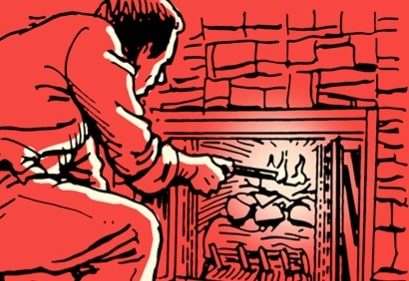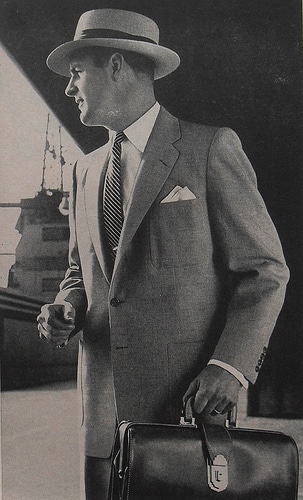Editor’s note: The following selection comes from The Technique of Building Personal Leadership (1944) by Donald A. Laird. It has been condensed from the original chapter.
A group of ambitious management executives attended a conference in the Societies’ Engineering Building in New York City. Almost all the men were college graduates. They were well dressed, well fed, polished. Each stated his opinions carefully and fluently. The meeting simply reeked of logic. But it was getting nowhere. It needed some magnetism to pull it together.
When it seemed that the conference might break up with nothing accomplished, a shrimp of a man sprang to his feet. He wore poorly fitting clothes, cut, in the fashion of a bygone day. The other men seemed amused at his appearance — at first. He began to speak, rapidly and in a high-pitched voice. He seemed excited. He had an accent like a Swedish comedian.
Before he had uttered fifty words the dignified men were listening attentively. Their amusement had disappeared. Soon the little old man had the group in the palm of his hand.
Why? Because he was the first to give off sparks!
The stuffed shirts had irradiated dignity but no sparks. This dried-up pip-squeak, with his shrill voice and a dialect that could be understood only part of the time, sparkled like the noon sunshine on the flowing blue ripples of a river. He lacked looks, bearing, and good speech, which the others had, but he had a priceless something the others lacked — a magnetic personality.
The little man was Carl Barth, the famous industrial engineer. He electrified the group by his personal magnetism.
This does not mean that he had more iron or electricity in his system. These sparks come from certain habits of acting, certain ways of doing everyday things.
Here are the 5 habits that [will make you] become magnetic.
1. Be Active
Fiorello La Guardia, congressman, mayor, and citizen of the world, has a magnetic personality. It has helped keep him in important offices for years. His short legs would be a handicap to many men who do not have his magnetism, but they keep La Guardia active, continually on the go.
He wears out his shoes, not his trousers.
Magnetic people are active people. They stand up when they might be sitting down. They move when they might be standing still.
Don’t get the idea that these magnetic people were born with something different that makes them active. This activity is very often deliberately assumed. Billy Sunday, for instance, was a quiet fellow, who impressed the members of his family as a bit on the indolent side. But when he was on the platform, when he wanted to lead people, he made himself become active. He was, in a sense, acting. His jumping, gesturing, shouting were part of a deliberate plan to be active. He was not born that way — he made himself that way to help him lead others.
Teddy Roosevelt is another who made himself active. Alone, he would be relaxed and easygoing. When visitors came, an instant transformation came over him. He moved with vigor, was intensely active, until the visitor left, whereupon he became a relaxed man. The important point is that he assumed an active manner when he was with people, but we should not overlook the fact that he knew how to let down and conserve energy between times. Had he been active every moment, he might have worn himself out prematurely. Be active when with others, relaxed when alone.
Magnetic people show their activity in their handshakes. They use no “dead-fish” handshake, no polite finger touching. They shake one’s hand.
They use their hands to gesture when they talk; they do not keep them stuffed in pockets. Teddy Roosevelt used his hands to carve out charts and symbols in the air as he talked. This activity holds interest and helps make ideas clear.
Magnetic folks give emphasis to some of their words. They pause a split second — electrifying attention by that pause — and then push out a word with more emphasis than usual. This is one of the secrets of Winston Churchill’s powerful magnetism over those who hear him. There is no monotone in his talk; he uses emphasis to make it sound like a military polka. Try yourself, on this simple greeting:
“I’m glad to meet you, Mr. Smith.”
Now repeat that greeting, putting the emphasis on the words indicated:
“I’m GLAD to meet you, Mr. SMITH.”
What a difference! The same words, but sparks are given off when some emphasis is used.
Further, you do not need to be born with a musical voice to have magnetic speech. Teddy Roosevelt had a squeaky voice, and knew it. Mayor La Guardia certainly has no booming baritone. It is not the voice you were born with that determines the magnetism; it’s how you use that voice. Make it active, along with the other activity of the magnetic personality.
2. Be Brisk
One of the first habits Theodore Roosevelt formed deliberately, in his boyhood, was to be brisk without being brusque. He had an active handshake, but a brief one. He stopped while the other person was expecting one more vigorous pump, one more squeeze of his fingers.
Teddy left them expectant.
His talk was brisk, too. He would talk actively for a few sentences, then stop in silence and let the other person carry on.
His glance was brisk. A few seconds of intense concentration into the other’s eyes, then to their hands, jewelry, chin.
He was brisk at social gatherings, the first to excuse himself from friendly groups.
Again, he left them expectant.
The essence of this habit of briskness is to leave people while they are expecting more. Quit while the quitting is good. Don’t wear out the welcome. Clear out before you run down.
When people come to talk with you, this briskness can be used, and without offending. Terminate interviews quickly, gracefully. One executive looks at his watch and then stands up to indicate that it is stopping time.
Another pushes back his desk work and lays down his pipe when someone comes into his office. When the discussion has reached the conclusion, so far as he is concerned, he puts his pipe in his mouth and draws the desk work back to him.
I have been in some private offices where a large, hand-lettered motto behind the executive served to remind the caller to be brief. “Time is precious — don’t waste it” one of these read. Another said, “To waste one’s own time is foolish — to waste others’ is stealing.” The caller could not fail to see and understand these admonitions as he looked at the executive. And I can give testimony that they made me be a bit briefer.
Most interviews can be brief. When they are not, the talk is likely to run around in circles, repeating itself to no point. Since many do not realize the value of briskness, the executive has to protect himself by such tricks in order to terminate the interview tactfully and unobtrusively.
But how do you break away from an interview? Many say they have trouble finding some excuse. No excuse is necessary. Whether you are leaving someone’s office, or a private home:
First. Stand up and say: “I simply have to go now!”
Second. Take your things and go!
Don’t let anything stop you between the first and second steps. If you are asked why you must go, well, say that Laird told you to — and don’t stop; keep right on moving.
When you start to leave, don’t stand still; keep moving, and toward the door. Don’t talk, either. Smile and keep going right out the door.
Neglect to be brief, and one becomes a bore. When Lord Dufferin arrived late at a luncheon, he apologized to the hostess by explaining that he had been detained by the Earl of Kimberley. Then he whispered: “A wonderful man! It is amazing how much he knows. He knows everything — everything! — all the corners of the earth and all the men in it. He knows everything, except — except when to stop!”
In his early days as toll collector on the canal, John H. Patterson had a small retail coal business as a sideline. He was continually short of money because people were slow to pay for their coal. His business was too small, too insecure, to serve as a basis for bank credit. But he borrowed, solely on his own credit. One morning he went to his banker and said:
“Mr. Phillips, I want to borrow $500 until Friday.”
“Write out a check for $500 to Mr. Patterson,” the banker instructed a clerk. Then he turned to the embryo businessman. “Let me give you a little advice. If you had not asked for it the way you did, if you had asked me how I felt and how business is, you would not have the money. Always be brief. And another thing, be sure to have the money back on Friday.”
Busy businessmen appreciate brevity.
3. Be Cheerful
People who have personal magnetism must be cheerful. They talk about glad tidings, not calamity. They encourage others, never emphasize discouragement. No matter what obstacles they realize are ahead, they talk and act success, not failure.
Others feel better after a few minutes with such people.
Just as the magnetic person leaves others feeling expectant by his briskness, so does he leave them in elevated moods by his cheerfulness, even when he has to pretend that cheerfulness. And more successful persons than you realize pretend they are cheerful.
I have a friend who had enough troubles to make him an ingrown grouch. Bert was seriously concerned about these, to be sure, but his wide circle of friends said they envied him his inborn fortitude. Inborn, nothing!
“I figured,” Bert told me with a warm smile, “that it wouldn’t help others any if I went around grouching and telling about my troubles. Neither would it do me any good, nor solve the trouble. So why not make them think I’m happy, even if I’m not!”
There is magnetism in a smile, in every evidence of cheerfulness.
4. Be Direct
A few years ago a blind student majored in my courses. Of the two dozen majoring students, he was by all odds the most magnetic and the most popular. He was, in fact, the most magnetic man on the campus. It was not because the students were sorry for Pat, either. He earned the popularity by being active, brisk, and cheerful. So were many other students, but Pat’s blindness, strangely enough, helped him to be more direct than any of the others.
Since he could not see those to whom he was talking, he spoke intently in the direction of their voices. He turned his face in that direction. He faced others when he talked to them and did not talk out of the corner of his mouth. Sightless, he spoke more directly to others than most people do.
The man who looks at the ceiling, out of the window, or at the third vest button is not being direct.
There are sparks given off when one looks intently at another, regardless of which one is doing the talking at the moment. That is what the blind student did, and since his atrophied eyes were hidden behind dark glasses he did not glare people out of countenance.
A man who has specialized in training retail sales clerks tells me that one of the most common errors of beginners is to look at the goods they are displaying. They should look at the customer, talk to the customer.
The leader has power over others from his direct glance and direct manner. There is a “look in the eye” of the leader. It is not a fierce or a haughty look; it is a direct look. He does not glare (the way Mussolini tried to do) or stare, like a country bumpkin on his first visit to the city. The leader looks intently at others. That intent, direct look establishes contact.
You can’t be magnetic by talking to the ceiling or looking at the floor.
5. Be Fearless
[An unmagnetic scientist I know] had always been extremely cautious about offending people. He had his convictions, to be sure, but he kept them to himself for fear he might cross someone. Not for love or money would he have done the unpopular thing. He went with the stream.
Such safe playing is apt to win contempt. Such folks are called the Mr. Milquetoasts. They are spineless, wishy-washy. Like a rubber stamp, they lack character and individuality.
The scientist’s character and accomplishments were without blemish, yet people looked down on him instead of respecting him. His playing-safe policy was revealed in every word and gesture. He had his convictions but was so pussyfooting about them that people guessed the opposite. He was yes man.
The natural leader has the gumption to scrap, if necessary, for what he thinks is right. He “speaks out in meeting” against injustice, graft, obsolete methods, blunders by the high and mighty.
This quality shows itself not just by sticking one’s chin out when there is trouble around. It is reflected in the tone of voice, firmness of glance and lips. It gains respect for the leader — and wins followers.
A veteran paratrooper was sitting at an adjoining table in the dining car. He was a private first class. His face was bronzed and firm. Three naval petty officers sat down at the table with him. The sailors had seen no active service; the paratrooper had. The sailors asked him dozens of questions, and he replied to each in a clipped firm but pleasant voice.
The sailors finished first, and as they left the table, each extended his hand to the unknown paratrooper and wished him good luck. He held the sailors in the palm of his hand because he seemed to ooze fearlessness from every pore.
In words, actions, and thoughts, the leader must be fearless. People, animals, and even vegetable life respond to the person who shows no fear.
I was helping my uncle on his small farm. Thistles had sprung up in the hayfield, and he put me to work clearing them out. I approached the first one tenderly, then let out a yelp of pain as its nettles stung my hand. Although it was a blistering hot day, I set up a cry for leather gloves to handle the thistles.
“It’s easy, if you know how,” my uncle said. “Look, like this. Grab hold firmly, as if you meant business. That crushes the prickers. Never pat a thistle.”
Some time later I was sent to a neighbor’s farm on an errand. As I neared the farmhouse, the dusk was gathering rapidly. I didn’t relish walking back in the dark. Then I heard the neighbor’s vicious watchdogs raising a noise at my approach. How I hated to complete the errand!
But it was too late to turn back, because the dogs were approaching me now, and there was not a friendly sign in the pack.
Then I remembered my uncle’s words: Never pat a thistle.
“Lie down! Get into the barn, you whelps,” I shouted at the dogs with all the mock courage I could put into my voice. I picked a stone from the roadside and threw it at the pack. They did what I had planned doing myself a few moments earlier. They ran the other way.
The lesson of those two experiences has been useful for me many times in dealing with people. Perhaps you feel no more bravery than I really felt, but show courage anyway.
Don’t overlook moral courage in connection with fearlessness. Teddy Roosevelt had physical fearlessness. A Wild West character, making fun of Teddy’s eyeglasses, picked a fight and drew a brace of guns on the effete easterner. The bullets hit in the ceiling as Teddy landed on the bad man with such force that the troublemaker was laid out cold. A few years later, low political rivals hired “Stubby” Collins, an underworld strong arm man, to beat up Teddy in the Delavan House in Albany. A few moments after Stubby accosted his “victim,” the accoster was being revived by his friends.
But keep an eye on Teddy’s moral courage, too. That is as important in leadership as physical courage. It takes both brands to make real leadership.
He would fight for an ideal, for what he believed was right, with just as much force as he would struggle to save his own life. There was the time, for instance, when he was indignant over some of the things being attempted by some factions of organized labor. Now a scheming politician is supposed to humor labor along, to be sure of their vote. But Roosevelt won more votes than he lost by his moral courage — he stood on a platform in front of an audience of thousands, shook an angry finger in the face of Samuel Gompers, head of the American Federation of Labor, and denounced him roundly.
Imagine the electric nature of that occasion. There were sparks aplenty!
No wishy-washy person would have the courage to do that. No yes man could do it. It took fearlessness, of which Roosevelt had a magnetic share.








